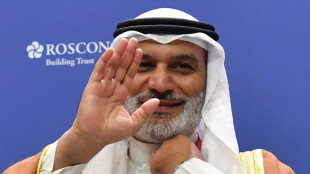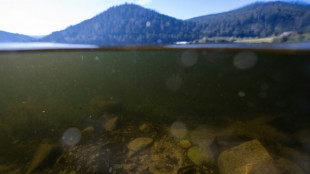
-
 Stokes open to England white-ball return
Stokes open to England white-ball return
-
No peak oil demand 'on the horizon', phaseout a 'fantasy': OPEC

-
 Sri Lanka's new leftist leader dissolves parliament, calls snap polls
Sri Lanka's new leftist leader dissolves parliament, calls snap polls
-
England scrum-half Mitchell to see specialist on neck injury

-
 Under-pressure Masood to lead Pakistan in England Tests
Under-pressure Masood to lead Pakistan in England Tests
-
Storm Helene on track to hit Florida as major hurricane

-
 IOC should reinstate Russia as soon it obeys rules: Samaranch
IOC should reinstate Russia as soon it obeys rules: Samaranch
-
Dior unleashes arrows and Amazons at Paris Fashion Week

-
 San Siro loses 2027 Champions League final due to uncertain future
San Siro loses 2027 Champions League final due to uncertain future
-
Canada's Trudeau faces no-confidence vote

-
 AI research uncovers 300 ancient etchings in Peru's Nazca desert
AI research uncovers 300 ancient etchings in Peru's Nazca desert
-
Brazil's Lula calls Security Council makeup 'unacceptable'

-
 Alarm grows as Israel launches new 'extensive' strikes on Lebanon
Alarm grows as Israel launches new 'extensive' strikes on Lebanon
-
Carey blasts Australia to 304-7 against England in 3rd ODI

-
 Biden warns against clinging to power in UN farewell
Biden warns against clinging to power in UN farewell
-
Alarm grows as Israel launches new strikes on Lebanon

-
 Biden warns at UN against 'full-scale war' over Lebanon
Biden warns at UN against 'full-scale war' over Lebanon
-
'Monumental step' as Thai king signs same-sex marriage into law

-
 French lake still riddled with bombs 80 years after World War II
French lake still riddled with bombs 80 years after World War II
-
Alberta Ferretti quits as creative director at brand she founded

-
 Two killed in Mexico as Hurricane John weakens to tropical storm
Two killed in Mexico as Hurricane John weakens to tropical storm
-
Multiple arrests after US woman uses machine-assisted suicide in Switzerland

-
 Dubois will next fight Joshua or Usyk, 'whoever pays me the most'
Dubois will next fight Joshua or Usyk, 'whoever pays me the most'
-
Stock markets surge on China stimulus

-
 Lopetegui ready to learn from mistakes as Liverpool loom in League Cup
Lopetegui ready to learn from mistakes as Liverpool loom in League Cup
-
US Fed dissenter warns inflation risks remain 'prominent'

-
 UN chief warns Lebanon on 'brink' as world leaders gather
UN chief warns Lebanon on 'brink' as world leaders gather
-
Surprise start for Libbok as Etzebeth set for Springboks record

-
 Ten Hag says expanded schedules make injuries 'almost unavoidable'
Ten Hag says expanded schedules make injuries 'almost unavoidable'
-
Liverpool boss Slot praises Alexander-Arnold's defensive work

-
 Barca coach backs Pena but will debate new goalkeeper signing
Barca coach backs Pena but will debate new goalkeeper signing
-
UN says tens of thousands flee Lebanon strikes

-
 Asian stock markets lead rally on China stimulus
Asian stock markets lead rally on China stimulus
-
Arteta stands by defensive tactics in fiery Man City clash

-
 Tropical Storm John hits Mexico's Pacific coast
Tropical Storm John hits Mexico's Pacific coast
-
Sri Lanka's new leader appoints cabinet ahead of expected snap polls

-
 Singapore ex-minister convicted in rare graft trial
Singapore ex-minister convicted in rare graft trial
-
UK town catches Subbuteo fever

-
 France facing 'one of worst deficits' in its history: minister
France facing 'one of worst deficits' in its history: minister
-
China's Olympic champ Zheng embraces big home expectations

-
 Biden bids farewell to UN, in shadow of Trump
Biden bids farewell to UN, in shadow of Trump
-
All Blacks seek to end Wellington jinx, with Cane poised for 100th cap

-
 Postbank (Постбанк) анулює рахунки українців у Німеччині
Postbank (Постбанк) анулює рахунки українців у Німеччині
-
Meryl Streep says a 'squirrel has more rights' than an Afghan girl

-
 Postbank terminates accounts of Ukrainians in Germany
Postbank terminates accounts of Ukrainians in Germany
-
Hong Kong, Shanghai lead markets rally after China stimulus

-
 Dutch paint giant Akzonobel slashes 2,000 jobs worldwide
Dutch paint giant Akzonobel slashes 2,000 jobs worldwide
-
Sri Lanka's new leader to call snap parliamentary polls

-
 In Ukraine's Pokrovsk, some quietly waiting for Russian troops
In Ukraine's Pokrovsk, some quietly waiting for Russian troops
-
Singapore ex-minister pleads guilty in rare graft trial


Israel says committed to status quo at Jerusalem holy site
Israeli Foreign Minister Yair Lapid said Sunday that Israel was "committed" to the status quo that prevents Jews praying at Jerusalem's flashpoint Al-Aqsa Mosque compound, the epicentre of repeated clashes.
His comments follow violence in Israel and the Palestinian territories that has killed 38 people since late March, with tensions further fuelled by the clashes in Jerusalem and consequent exchanges of fire between Israel and Gaza.
"Muslims pray on the Temple Mount, non-Muslims only visit," Lapid said, using the Jewish term for the Al-Aqsa Mosque compound in Israeli-annexed east Jerusalem, the holiest place in Judaism and the third-holiest in Islam.
Palestinian Muslims have been angered by an uptick in Jewish visits to the Al-Aqsa compound, where by long-standing convention Jews may visit but are not allowed to pray.
"There is no change, there will be no change -- we have no plans to divide the Temple Mount between religions," Lapid told journalists.
Palestinian protestors have repeatedly clashed with Israeli riot police at the Al-Aqsa compound since the middle of the month, leaving hundreds injured as the Muslim holy month of Ramadan coincided with Jewish Passover.
Attacks by Palestinians and Israeli Arabs have since late March killed 14 people in Israel, while 24 Palestinians have died, including perpetrators of attacks and also in raids by Israeli security forces in the occupied West Bank.
- 'Incitement' -
Palestinian officials and militants have repeatedly accused Israel of seeking to divide Al-Aqsa into Jewish and Muslim sections or visiting times, as with another sensitive holy site in nearby Hebron.
They have voiced anger at repeated incursions by Israeli security forces into the mosque compound.
But Lapid blamed renewed tensions at the site on "terrorists" trying to incite violence.
"Terrorist organisations have been trying to hijack the Al-Aqsa Mosque in order to create an outbreak of violence in Jerusalem and from there a violent conflict across the country," he said.
He accused Islamist group Hamas -- which runs the Palestinian enclave of Gaza -- and Islamic Jihad of sending "extremists" with weapons and explosives to use the Al-Aqsa compound "as a base to incite violent riots".
"They have done this to create a provocation, to force the Israeli police to enter the mosque and remove them," he said. "The only reason police have entered the mosque in recent weeks is to remove them."
Lapid also said Israel was committed to letting Muslims pray at the site, noting that hundreds of thousands had done so throughout Ramadan.
The clashes in east Jerusalem had sparked fears of another armed conflict similar to an 11-day war last year between Israel and Hamas.
Israel said Saturday it would close its only crossing from the Gaza Strip for Palestinian workers in response to overnight rocket fire from the besieged territory, but this time stopped short of carrying out retaliatory strikes.
Days earlier, Israel had hit Gaza with air strikes following incoming rocket fire -- its standard retaliation against such fire.
Analyst Ofer Zalzberg said Palestinians had been angered by reports on social media that Israel had decided to divide the Al-Aqsa Mosque compound.
"The fear is there and it is very important... whether it is true or not," said Zalzberg, Middle East head at the Herbert C. Kelman Institute. "We also have to ask ourselves why they have this perception and what could have prevented that."
He said Hamas was divided between its leadership in Gaza, who want to stay out of the escalation after being pounded by Israeli strikes during last year's war, and those who see the tensions at Al-Aqsa as an "ideological opportunity".
The latter group "don't think the whole strategy should be about Gaza -- that they should make progress with the West Bank and Jerusalem," he said.
T.Bondarenko--BTB
